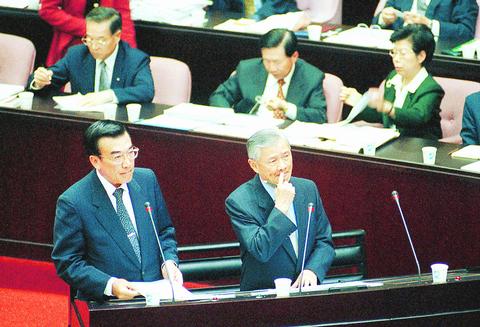Premier Tang Fei (
Anti-nuclear legislators and legal experts, however, said the legal basis to terminate the project lay in the Constitution, which takes precedence over the Budget Law.
Controversy over the legal basis to terminate the power plant project was stirred on Monday when Lin Chuan (

PHOTO: CHEN CHENG-CHANG, TAIPEI TIMES
According to the article, the government may only stop drawing on a budget in the case of a national emergency. Whether the condition applies to the power plant case, however, is uncertain.
Lin's opinion was echoed yesterday by KMT officials, who are in favor of nuclear energy.
Answering legislators' questions, Premier Tang said yesterday that the Ministry of Economic Affairs was reviewing the final recommendation made by its Fourth Nuclear Power Plant Re-evaluation Committee (
"No matter what suggestions are made by the Executive Yuan, they are only to give the DPP more information," said Tang, adding that the future of the plant would still be decided in accordance with the law.
Meanwhile, law professors urged yesterday that officials and legislators consider the issue based on both Article 70 of the Constitution, as well as Interpretation No. 391 of the Council of Grand Justices.
"The Executive Yuan will not break the law at all if it fails to execute an approved budget," said Chen Tzu-yang (陳慈陽), a law professor at National Taipei University, at a public forum held at the Legislative Yuan.
Taking the power plant project as an example, Chen said that all the Executive Yuan had to do was to give reasons for not executing the budget. Simply, the Executive Yuan has to explain how the original purpose of building the power plant -- to provide the public with sufficient power -- will be achieved by others means.
Anti-nuclear legislators said yesterday that the project had become a pawn in a political struggle.
"I regret the actions of some who stressed that there was no legal basis for halting the project," said KMT Legislator Jao Yung-ching (
"They should have respected the suggestions of experts in the economic affairs ministry's task force for a review of the project," Jao said.
New Party legislator Hsieh Chi-ta (謝啟大) said the New Party was producing a pamphlet against the nuke project, which gives reasons from a variety of perspectives, ranging from law, economics and energy, to sustainable development.
The KMT, on the other hand, revealed yesterday the results of a survey on the public's attitude toward the project. KMT officials said that 55 percent of interviewees supported continuation of the project. In addition, KMT officials said, 55 percent of interviewees would not welcome higher electricity prices caused by the halt of the project.
The survey questioned 1,097 residents over the age of 20 in 24 administrative districts.

US President Donald Trump yesterday announced sweeping "reciprocal tariffs" on US trading partners, including a 32 percent tax on goods from Taiwan that is set to take effect on Wednesday. At a Rose Garden event, Trump declared a 10 percent baseline tax on imports from all countries, with the White House saying it would take effect on Saturday. Countries with larger trade surpluses with the US would face higher duties beginning on Wednesday, including Taiwan (32 percent), China (34 percent), Japan (24 percent), South Korea (25 percent), Vietnam (46 percent) and Thailand (36 percent). Canada and Mexico, the two largest US trading

ACTION PLAN: Taiwan would expand procurement from the US and encourage more companies to invest in the US to deepen bilateral cooperation, Lai said The government would not impose reciprocal tariffs in retaliation against US levies, President William Lai (賴清德) said yesterday, as he announced five strategies to address the issue, including pledging to increase Taiwanese companies’ investments in the US. Lai has in the past few days met with administrative and national security officials, as well as representatives from various industries, to explore countermeasures after US President Donald Trump on Wednesday last week announced a 32 percent duty on Taiwanese imports. In a video released yesterday evening, Lai said that Taiwan would not retaliate against the US with higher tariffs and Taiwanese companies’ commitments to

‘SPECIAL CHANNEL’: Taipei’s most important tasks are to stabilize industries affected by Trump’s trade tariffs and keep negotiations with Washington open, a source said National Security Council Secretary-General Joseph Wu (吳釗燮) arrived in the US for talks with US President Donald Trump’s administration, a source familiar with the matter said on Friday. Wu was leading a delegation for a meeting known as the “special channel,” the Financial Times reported earlier. It marked Trump’s first use of the channel since returning to the White House on Jan. 20. Citing a source familiar with the matter, the Financial Times reported that Minister of Foreign Affairs Lin Chia-lung (林佳龍) was also a part of the delegation. The visit came days after China concluded war games around Taiwan and amid Trump’s

CHIP EXCEPTION: An official said that an exception for Taiwanese semiconductors would have a limited effect, as most are packaged in third nations before being sold The Executive Yuan yesterday decried US President Donald Trump’s 32 percent tariff on Taiwanese goods announced hours earlier as “unfair,” saying it would lodge a representation with Washington. The Cabinet in a statement described the pledged US tariffs, expected to take effect on Wednesday next week, as “deeply unreasonable” and “highly regrettable.” Cabinet spokeswoman Michelle Lee (李慧芝) said that the government would “lodge a solemn representation” with the US Trade Representative and continue negotiating with Washington to “ensure the interests of our nation and industries.” Trump at a news conference in Washington on Wednesday announced a 10 percent baseline tariff on most goods